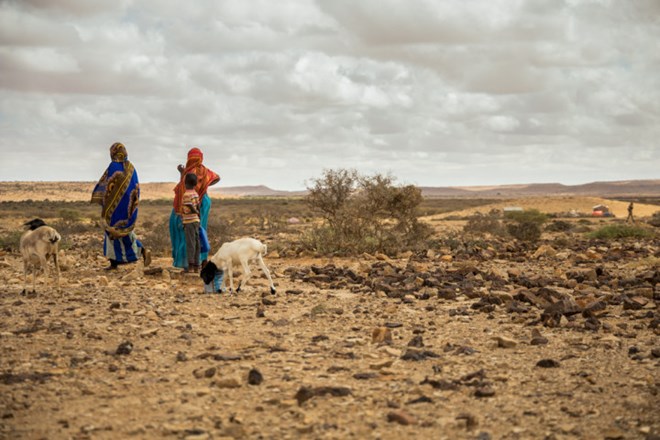By Damon Bristow

Helping communities to adapt to the risks posed by climate change is essential. Abdikarim MOHAMED/ICRC
Somalia is living on the front lines of climate change. Climate-related hazards have tripled since 1990. Since then, the county has experienced 31 droughts, floods and other climatic events– three times the number experienced between 1970 and 1990.
This year’s drought is reported to be Somalia’s worst in 40 years. With a failed fifth rainy season predicted the situation will worsen. More than half the population, 7.8m people, are already affected, 300,000 are at risk of falling into famine and 1.8 million under the age five are facing acute malnutrition.
advertisements
Over one million have been displaced this year alone, most moving to the country’s cities – it’s no surprise that Somalia is the most urbanised country in Africa. Rising food and fuel prices stoked by Russia’s invasion of Ukraine are adding to an already dire picture. We’ve all seen how the effects of climate change and how it is holding back economic and social development, contributing to competition and conflict over resources. According to IMF, the drought will slow Somalia’s economic growth from 2.9 to 1.9% this year.
Simply put, the most vulnerable communities are losing everything: livelihoods, homes, and vital access to water and food. What’s more their prospects for a better and more prosperous future are also being steadily undermined.
As one of the most climate-vulnerable countries in the world, climate finance and climate adaptation is the lifeline Somalia needs to adapt to a changing climate and build a resilient future. The costs of inaction are high.
At the ongoing COP27 gathering in Egypt, President Hassan Sheikh said, ‘The world must take urgent action to ensure that climate adaptation and mitigation investment is actioned upon urgently now to make tomorrow a reality.' I couldn’t agree with this statement more. Climate financing and political commitment can reduce the need for humanitarian aid.
As Somalia tetters on the brink of famine, the UK is responding to climate extremes in Somalia by addressing urgent humanitarian needs – the first and foremost. In September, we provided 6.5 million Somalis with emergency cash transfers to buy food
We are also ensuring immediate and safe access to water, sanitation and hygiene by supporting the rehabilitation of critical water catchment infrastructure and providing improved and sustained water access. We have provided almost 50,000 people with live-saving health and nutrition services and supplies.
But it is vital that we break the cycle of crises. We are therefore investing in efforts to support communities to prepare for, mitigate and recover from the impact of climate extremes.
In Gedo for example, farmers are reporting that, they are able to farm and sell vegetables and improve their income - thanks to water investment and agriculture training. The community leader in the village of Bandar reported that many people who would have otherwise moved out because of the drought stayed because of projects which restored their farms productivity.
At COP27, the UK has also stepped-up climate finance support for African countries, providing £200m to combat severe drought and floods across the continent, as well as calling attention to the need for more focus on adaptation.
It’s also important that the multilateral climate funds work better for countries like Somalia. Research shows that the more fragile a country is, the less adaptation finance it receives
Somalia is ranked 71 out of 79 in low to lower-middle-income countries in terms of funding approved by multilateral climate funds. Shockingly the average time frame from submitting a project proposal to receiving the funding is over five years. The UK will continue to support Somali Government’s efforts to improve the national dialogue on climate finance applications
Overcoming these barriers requires a dedicated approach. Such as a tailored financial mechanism and resource allocation criteria that are simplified and fit for contexts of conflict. This would improve Somalia’s chances to access funding for adaptation programming and allow more local actors in Somalia to independently access climate finance.
Civil society and the Somalia private sector also have important roles to play in mobilising resources and collective action to adapt to climate change.
---
Damon Bristow is the UK’s Development Director Somalia since 2019. His career in DFID spans over eleven years having worked in DFID Afghanistan, Tanzania, Pakistan and North and South Sudan as well as Global Health Security and Regional Trade and Integration in Central Asia. Prior to being posted to Somalia